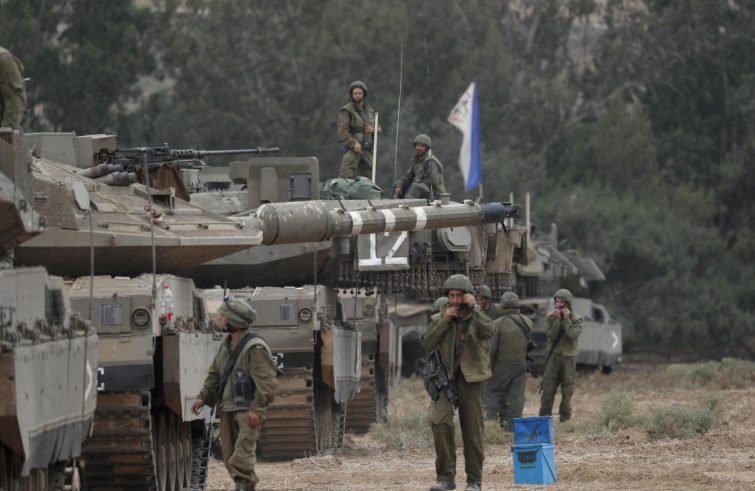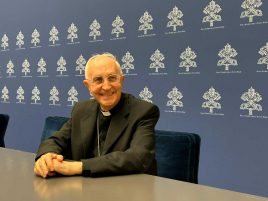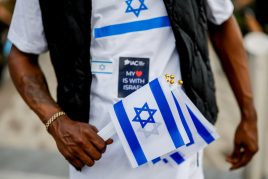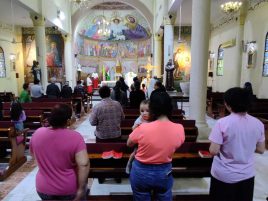
“It is unacceptable to deny Israel’s right to exist, to live and to be. The same goes for the Palestinian people. There are two rights and neither is greater than the other. As long as this division is not overcome, it will be extremely difficult to resolve this dramatic situation.”
 His Eminence Cardinal Fernando Filoni, Grand Master of the Equestrian Order of the Holy Sepulchre of Jerusalem (30,000 men and women serving as knights and dames in 64 lieutenancies and 40 countries, Ed.s note), commented on the ongoing war between Israel and Hamas on October 31, on the sidelines of the presentation of the Order’s 2023 Consultation, to be held in Rome November 6-9, on the theme of formation. “Unless this conflicting perspective is overcome and the rights of all are respected, the clashes will continue”, he said. “We have a mission for peace – and the Pope is constantly renewing his appeal – which requires dialogue and respect for mutual rights.” SIR interviewed the Cardinal, former Apostolic Nuncio to Iran, Iraq and Jordan, on the conflict in Gaza.
His Eminence Cardinal Fernando Filoni, Grand Master of the Equestrian Order of the Holy Sepulchre of Jerusalem (30,000 men and women serving as knights and dames in 64 lieutenancies and 40 countries, Ed.s note), commented on the ongoing war between Israel and Hamas on October 31, on the sidelines of the presentation of the Order’s 2023 Consultation, to be held in Rome November 6-9, on the theme of formation. “Unless this conflicting perspective is overcome and the rights of all are respected, the clashes will continue”, he said. “We have a mission for peace – and the Pope is constantly renewing his appeal – which requires dialogue and respect for mutual rights.” SIR interviewed the Cardinal, former Apostolic Nuncio to Iran, Iraq and Jordan, on the conflict in Gaza.
Your Eminence, did you expect this resurgence of the Israeli-Palestinian conflict, which seemed to have disappeared from the agendas and diplomatic commitments of the international community?
Unfortunately, this is a conflict that flares up periodically. But I certainly did not expect it to be so violent and so tragic. The difference between what we have unfortunately become used to seeing and what we have seen in the last few days is that in the past the conflict was intermittent, now it is a full-blown war. You mention the fact that the conflict seemed to have “disappeared from the agendas of the international community”, which is a deep-rooted cause of the situation we see today: so much time has passed without real solutions and this has led to this violent flare-up.
 In a letter to the faithful of the diocese, Cardinal Pierbattista Pizzaballa, Latin Patriarch of Jerusalem, described this period as “one of the most difficult and painful in our recent history”, and the massacre of both Israeli and Palestinian civilians testifies to this… How could this have happened?
In a letter to the faithful of the diocese, Cardinal Pierbattista Pizzaballa, Latin Patriarch of Jerusalem, described this period as “one of the most difficult and painful in our recent history”, and the massacre of both Israeli and Palestinian civilians testifies to this… How could this have happened?
The Patriarch, Card. Pizzaballa, is absolutely right. This is one of the most painful and complex conflicts in the recent history of the Holy Land. You ask how it was possible to reach this point: when a volcano accumulates a lot of energy, the pressure is enormous and sooner or later it explodes. All the anger, injustice, suffering, provocation, oppression and lack of freedom explain why the conflict has unfortunately escalated to this point.
These are tragedies that the Church has unreservedly condemned. But we cannot stop at condemnation. What is the priority to be pursued? Perhaps a ceasefire? How can the humanitarian emergency in the Strip be resolved?
Denouncing evil, injustice and suffering is good, but it hardly solves anything. It is not enough to identify the disease and not treat it with medicine. In my opinion, there are two priorities that need to be pursued at the moment in order to ensure that a ceasefire can take place, acting on a humanitarian level and laying the foundations for a future solution. On the part of Hamas, this means releasing prisoners and recognising Israel’s right to exist. For Israel, it means recognising the existence and activities of a Palestinian state and releasing Palestinian prisoners. I understand the difficulties involved, but it could be a way not only to address the immediate emergency but also to open up a new perspective without succumbing to déjà vu, which has unfortunately not borne fruit.
How can this war be stopped?
As someone who has lived in the region for several years (Iran, Iraq, Jordan, and now I am dedicating my service to the Holy Land), the war can only be won by eradicating the causes and by allowing common sense and human values, which for the believer are rooted in God, to prevail.
More than 200 people are being held hostage by Hamas: there has been much talk of the Church mediating for their release. Does the local Church have a history of dialogue with anyone… including Hamas?
It does, provided there is goodwill on the part of the involved parties. I remember when Paul VI, at a very difficult time, when international and national terrorism was raging, voluntarily offered himself in exchange for the victims and the prisoners. This attitude is always and consistently present in the Church… as an example, I would like to recall Father Maximilian Kolbe. Even today, Patriarch Pizzaballa, with great sensitivity, offered himself in exchange for the release of the hostages. It is also worth remembering that the history of the local Church in this land goes back a long way, with Christians living and residing on both sides: a small but important presence.
 Amid the violence, the presence of Gaza’s small Christian community does not go unnoticed and despite suffering a number of casualties in the bombing of the Greek Orthodox Church of St Porphyrios, it provided shelther to displaced people and has been relentless in its prayers for peace. “Their pains are great, and yet , with each passing day, I realise more clearly that they are at peace. They are frightened, shocked, upset, but they are at peace in their hearts,” said Cardinal Pizzaballa, referring to the Christians of Gaza. What is the significance of this small Christian presence in Gaza and in the current context of war?
Amid the violence, the presence of Gaza’s small Christian community does not go unnoticed and despite suffering a number of casualties in the bombing of the Greek Orthodox Church of St Porphyrios, it provided shelther to displaced people and has been relentless in its prayers for peace. “Their pains are great, and yet , with each passing day, I realise more clearly that they are at peace. They are frightened, shocked, upset, but they are at peace in their hearts,” said Cardinal Pizzaballa, referring to the Christians of Gaza. What is the significance of this small Christian presence in Gaza and in the current context of war?
Christians have been present in Gaza for a long time, surviving many hardships, sharing their suffering with the whole population. The situation today is not any different. That is why I welcome Cardinal Pizzaballa’s description of this small community as a presence in the midst of suffering, but also as a presence of peace. Let us support this population with prayer, affection and encouragement, and may they feel the spiritual and moral support of the entire Catholic Christian community. These were the same sentiments I shared with the Christian community in Iraq during the war. I often remember what an Iraqi taxi driver said to the nuns who lived there with me: “Please don’t leave. You are the part of humanity that helps us to live in moderation.”
Do you still believe in the two-peoples, two-State solution?
This is an extremely sensitive issue, which has been in the making for years and which has not yet found unanimous support. But this solution can only be achieved with the agreement of both sides. We support this option if Israel and Palestine also agree, while respecting their respective identities, histories and the territories in which they live. The Holy See remains faithful to its position on this matter.
How does the Order of the Holy Sepulchre plan to support the Latin Patriarchate and the local Christian community?
The Order of the Holy Sepulchre has traditionally worked alongside the Latin Patriarchate of Jerusalem – and other ecclesial realities in the area – supporting the needs identified by the Patriarchate. At a time like this, the members of the Order are asking what more they can do to express their closeness and solidarity with the populations affected by the current conflict. The Order has a Solidarity Fund which is already receiving contributions from people who want to show their human closeness to the suffering population through the action of the Latin Patriarchate of Jerusalem. For us, the Holy Land remains a place of encounter.











